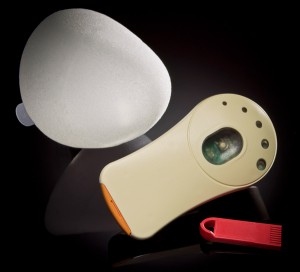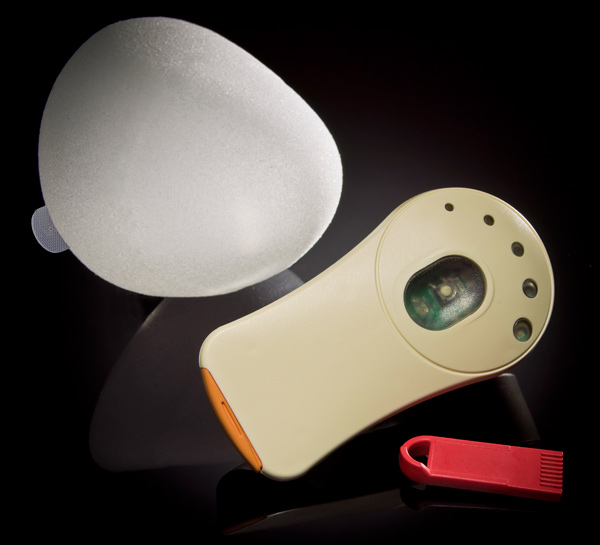 The latest data from AirXpanders Inc.’s clinical study of its new expansion system for mastectomy patients undergoing breast reconstruction, AeroForm, were presented at Plastic Surgery The Meeting, the annual scientific meeting of the American Society of Plastic Surgeons (ASPS).
The latest data from AirXpanders Inc.’s clinical study of its new expansion system for mastectomy patients undergoing breast reconstruction, AeroForm, were presented at Plastic Surgery The Meeting, the annual scientific meeting of the American Society of Plastic Surgeons (ASPS).
The AeroForm tissue expander is a patient controlled breast tissue expander that comes equipped with a small handheld wireless controller that administers small amounts of CO2 into the device, stretching the skin to accommodate a permanent breast implant. This method eliminates the need for percutaneous saline injections, shortens tissue expansion time from months to weeks, reduces pain and discomfort experienced by patients, can improve cosmetic outcomes for a natural form and shape and reduces overall time and costs.
Jeffrey A. Ascherman, MD, FACS, Site Chief, Division of Plastic Surgery at New York-Presbyterian Hospital/Columbia UniversityMedical Center, presented the latest results on 138 patients from the XPAND trial, where 138 patients implanted with the investigational AeroForm successfully completed their expansion within an average of 18.2 days, which is a significant improvement when compared with the 57.4 days of the control group undergoing traditional saline injections.
“AeroForm expanders continue to allow women to safely and almost painlessly complete the tissue expansion process in a matter of days instead of weeks,” Dr. Ascherman, principal investigator of the XPAND study said in a PR NewsWire press release. “Many of my patients who were randomized to the AeroForm arm said that having control of their expansion process was the first time they’ve felt in control of their bodies since their breast cancer diagnosis. Given the dramatically superior results seen so far, I would expect this technology to have a meaningful impact on breast reconstruction techniques going forward and help make tissue expansion a significantly smaller part of the process if the technology is approved in the U.S.”
In addition to the XPAND trial, several different studies were presented at the meeting.
Tony F. Connell, MD, the Perth, Australia-based surgeon presented the final data from the single-arm, single-site PACE 2 (Patient Activated Controlled Expansion) and ASPIRE (Study of AeroForm Tissue Expander for Breast Reconstruction) trials, along with analyses on the impact of air travel and radiation therapy on the devices.
To date, over 20 patients with the implanted device have flown at altitudes above 1,000 meters, with the only associated effect described as a slight filling sensation upon taking-off. These observations allowed researchers to confirm the safety of the device in high-altitude flights. Nonetheless, Dr. Connell recommended that dosing should be discontinued prior to flying and continued afterwards.
Dr. Connell also reported the device was safe to use during radiation therapy treatment of up to 75 Gy, since the presence of a metallic reservoir inside AeroForm did not interfere with radiation delivery.
[adrotate group=”3″]
Finally, PACE 2 data, published in the October issue of Plastic and Reconstructive Surgery, revealed that 33 women with breast cancer, family history, or predisposition because of the BRCA1 or BRCA2 gene mutation who underwent reconstructive breast surgery and were implanted with the AeroForm expanders, completed their expansion in an average of 17 days.
“We believe a woman deserves a comfortable, efficient road to recovery and the highest quality of life possible following a mastectomy,” Scott Dodson, AirXpanders President and Chief Executive Officer, added in the press release. “We are incredibly proud that the AeroForm system continues to significantly and safely shorten the time required to expand, eliminate the need for percutaneous saline injections and provide a more natural form and shape for a permanent implant to fill. As we enroll the final patients into the XPAND study and work towards a potential FDA clearance, we remain on track with our plans to roll out this important new treatment option in Australia. We continue to work towards our goal of providing breast reconstruction patients with a quicker, more comfortable and convenient method of tissue expansion.”

